
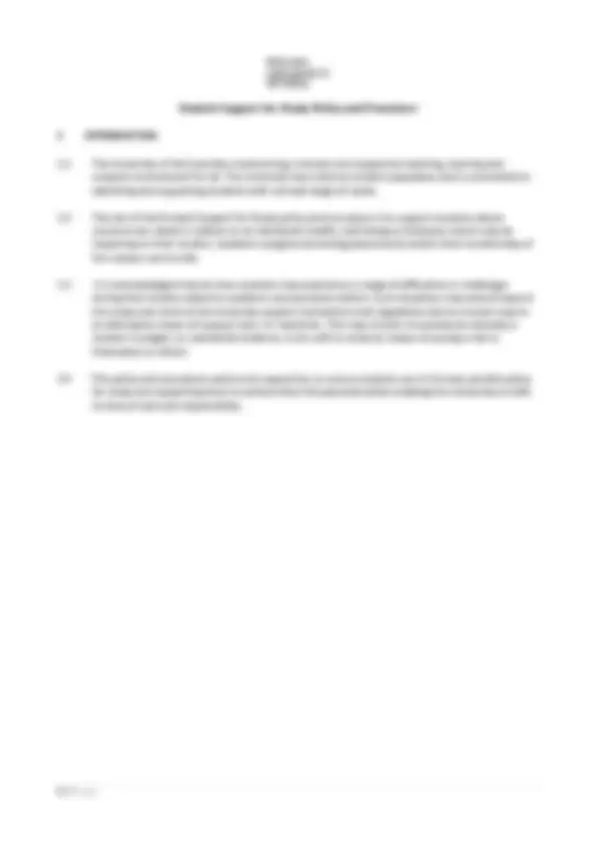
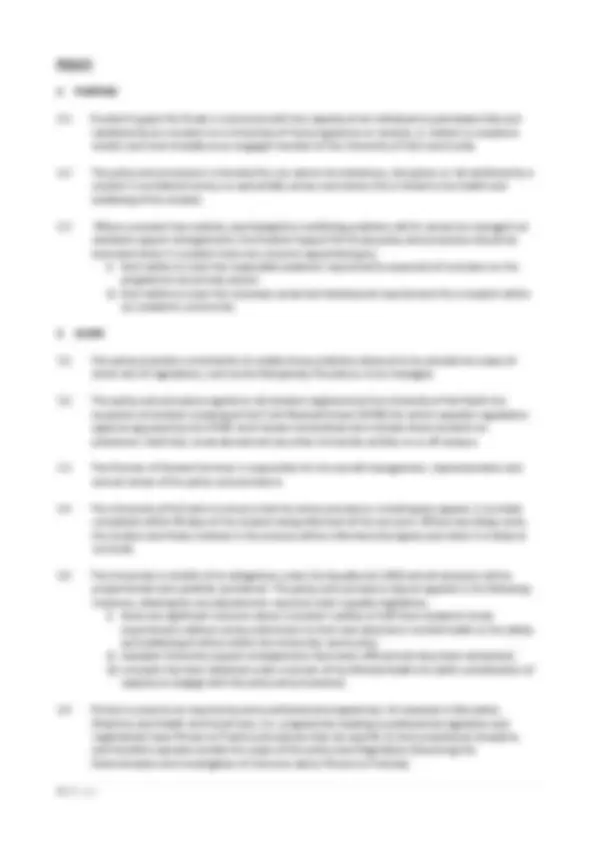
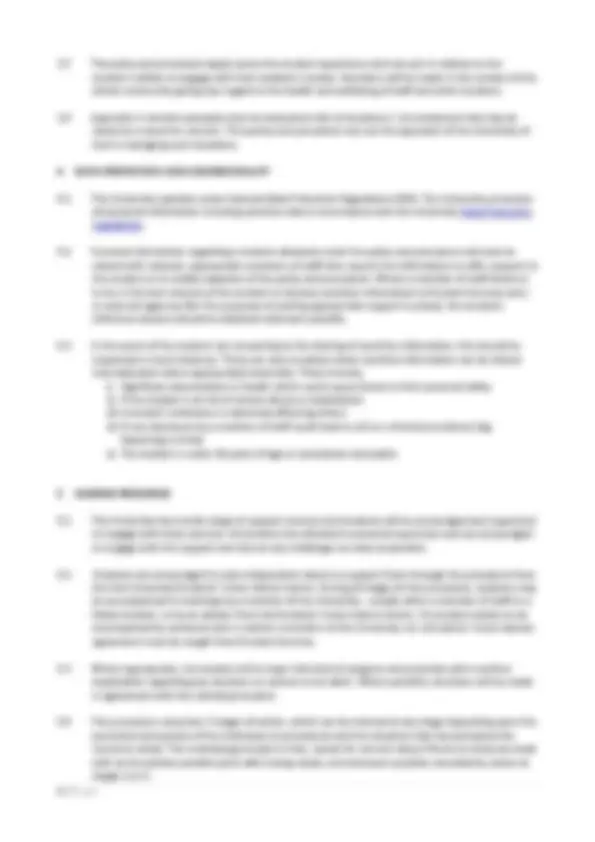
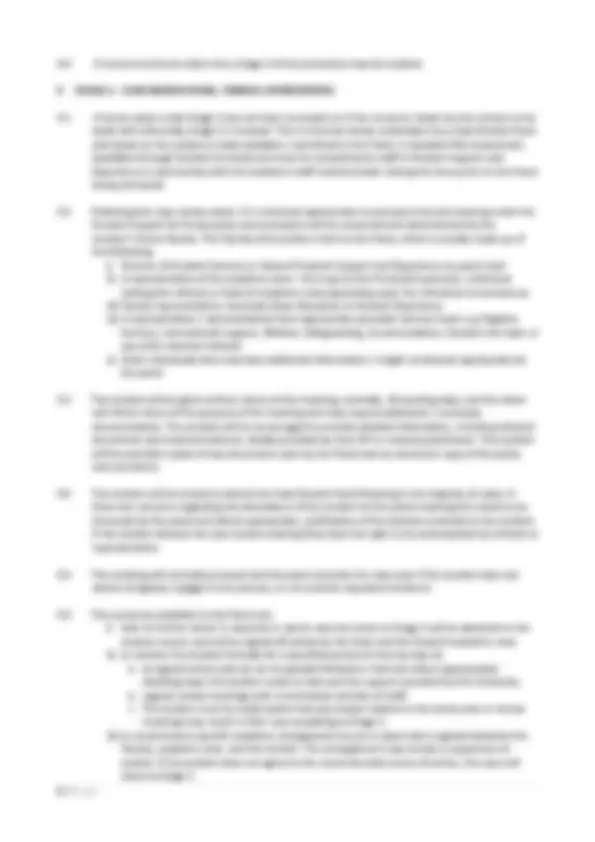
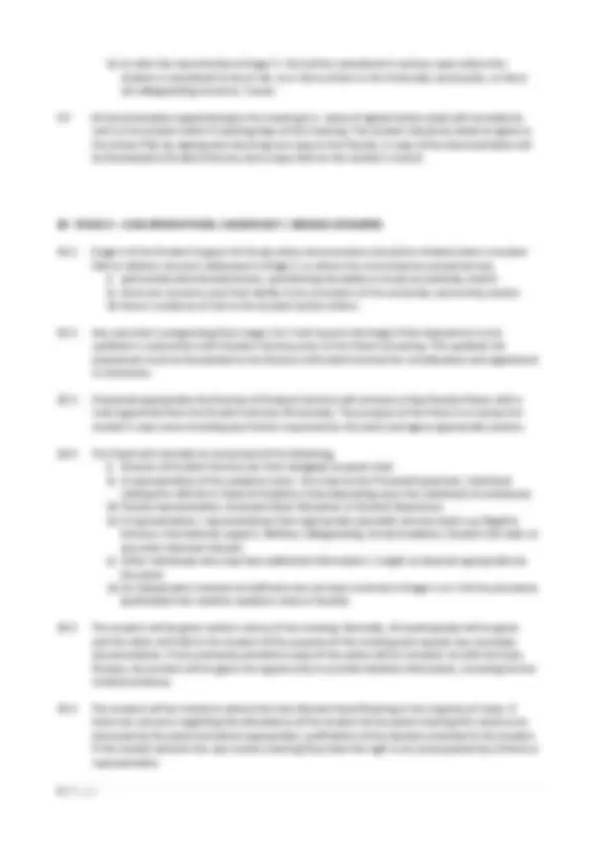
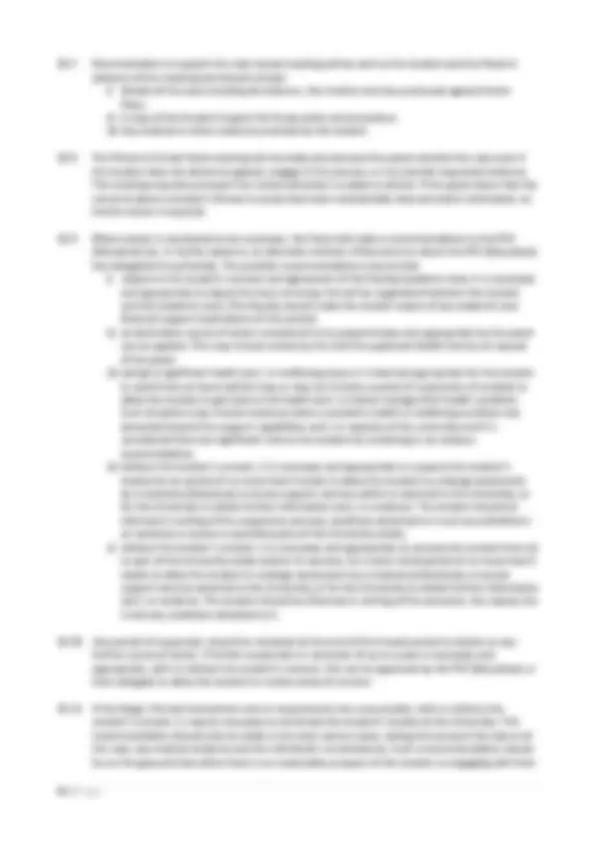
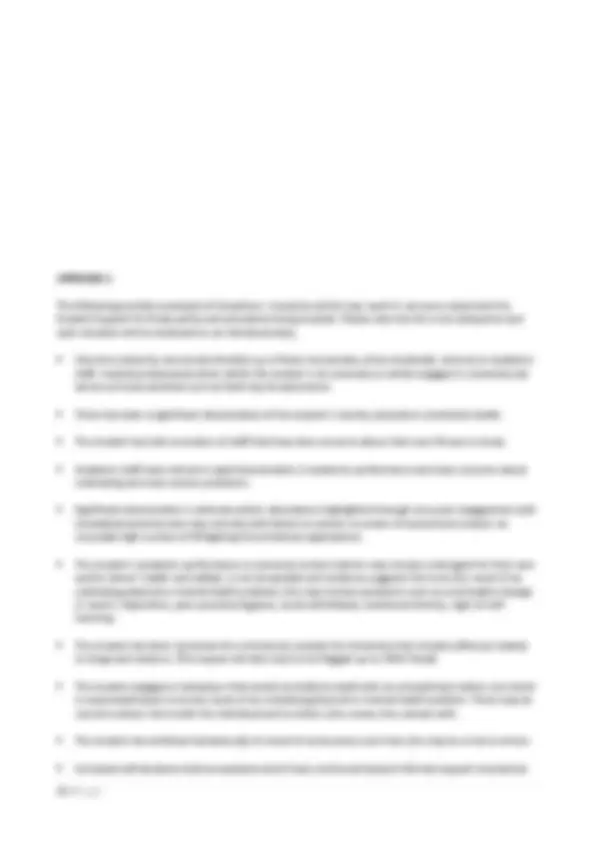



Study with the several resources on Docsity

Earn points by helping other students or get them with a premium plan


Prepare for your exams
Study with the several resources on Docsity

Earn points to download
Earn points by helping other students or get them with a premium plan
Community
Ask the community for help and clear up your study doubts
Discover the best universities in your country according to Docsity users
Free resources
Download our free guides on studying techniques, anxiety management strategies, and thesis advice from Docsity tutors
The University of Hull's Student Support for Study policy and procedure, which aims to support students with health, well-being, or behavioural issues that may impact their studies or campus membership. The policy provides a mechanism for managing concerns outside the scope of other regulations and includes instances where students may need additional support to meet academic requirements or social and behavioural expectations.
What you will learn
Typology: Schemes and Mind Maps
1 / 14

This page cannot be seen from the preview
Don't miss anything!









(replacing the Fitness to Study policy and procedure) Author: Director of Student Services Version: 2 Version issued on: January 2021 – revised May 2021 Review date: 1 st^ June 2022 Consultation process: University Student Experience, Engagement and Employability Committee (USEEEC) Ratified by: Senate Target audience: All University students, staff and applicants Distribution: Website and SharePoint When this document is viewed as a paper copy, the reader is responsible for checking that it is the most current version on the University SharePoint site.
2.1 Student Support for Study is concerned with the capacity of an individual to participate fully and satisfactorily as a student on a University of Hull programme or module, in relation to academic studies and more broadly as an engaged member of the University of Hull community. 2.2 The policy and procedure is intended for use where the behaviour, disruption or risk exhibited by a student is considered serious or potentially serious and where this is linked to the health and wellbeing of the student. 2.3 Where a student has medical, psychological or wellbeing problems which cannot be managed via standard support arrangements, the Student Support for Study policy and procedure should be exercised when it is evident there are concerns appertaining to; i) their ability to meet the reasonable academic requirements expected of a student on the programme concerned; and/or ii) their ability to meet the necessary social and behavioural requirements for a student within our academic community 3 SCOPE 3.1 This policy provides a mechanism to enable those problems deemed to be outside the scope of other sets of regulations, such as the Disciplinary Procedure, to be managed. 3.2 This policy and procedure applies to all students registered at the University of Hull (with the exception of students studying at Hull York Medical School [HYMS] for which separate regulations apply as approved by the HYMS Joint Senate Committee) and includes those students on placement, field trips, study abroad and any other University activity on or off campus. 3.3 The Director of Student Services is responsible for the overall management, implementation and annual review of the policy and procedure. 3.4 The University of Hull aims to ensure that the entire procedure, including any appeal, is normally completed within 90 days of the student being informed of the concerns. Where any delays arise, the student and those involved in the process will be informed of progress and when it is likely to conclude. 3.5 The University is mindful of its obligations under the Equality Act 2010 and all decisions will be proportionate and carefully considered. The policy and procedure may be applied in the following instances, allowing for any adjustments required under equality legislation; i) there are significant concerns about a student’s ability to fulfil their academic study requirements without serious detriment to their own physical or mental health or the safety and wellbeing of others within the University community; ii) standard University support arrangements have been offered and have been exhausted; iii) a student has been detained under a section of the Mental Health Act (with consideration of capacity to engage with the policy and procedure). 3.6 Fitness to practice as required by some professional programmes, for example in Education, Medicine and Health and Social Care, (i.e. programmes leading to professional regulation and registration) have Fitness to Practice procedures that are specific to their practitioner discipline, and therefore operate outside the scope of this policy (see Regulations Governing the Determination and Investigation of Concerns about Fitness to Practise).
3.7 The policy and procedure apply across the student experience and not just in relation to the student’s ability to engage with their academic studies. Decisions will be made in the context of the whole community giving due regard to the health and wellbeing of staff and other students. 3.8 Appendix 1 contains examples (not an exhaustive list) of situations / circumstances that may be raised as a cause for concern. This policy and procedure sets out the approach of the University of Hull in managing such situations. 4 DATA PROTECTION AND CONFIDENTIALITY 4.1 The University operates under General Data Protection Regulations 2018. The University processes all personal information including sensitive data in accordance with the University Data Protection regulations. 4.2 Personal information regarding a student obtained under the policy and procedure will only be shared with relevant, appropriate members of staff who require the information to offer support to the student or to enable adoption of the policy and procedure. Where a member of staff deems it to be in the best interest of the student to disclose sensitive information to Student Services and / or external agencies (for the purposes of putting appropriate support in place), the students informed consent should be obtained wherever possible. 4.3 In the event of the student not consenting to the sharing of sensitive information, this should be respected in most instances. There are rare occasions when sensitive information can be shared internally (and where appropriate) externally. These include; i) Significant deterioration in health which could cause threat to their personal safety ii) If the student is at risk of serious abuse or exploitation iii) A student’s behaviour is adversely affecting others iv) If non-disclosure by a member of staff could lead to civil or criminal procedures (eg. Reporting a crime) v) The student is under 18 years of age or considered vulnerable 5 GUIDING PRINCIPLES 5.1 The University has a wide range of support services and students will be encouraged and supported to engage with these services. All students are allocated a personal supervisor and are encouraged to engage with this support and discuss any challenges as early as possible. 5.2 Students are encouraged to seek independent advice to support them through the procedure from the Hull University Students’ Union Advice Centre. During all stages of the procedure, students may be accompanied to meetings by a member of the University - usually either a member of staff or a fellow student, or by an advisor from the Students' Union Advice Centre. If a student wishes to be accompanied by someone who is neither a member of the University nor a Students' Union advisor agreement must be sought from Student Services. 5.3 Where appropriate, the student will be kept informed of progress and provided with a written explanation regarding any decisions or actions to be taken. Where possible, decisions will be made in agreement with the individual student. 5.4 The procedure comprises 3 stages of action, which can be entered at any stage depending upon the perceived seriousness of the individual circumstances and the situation that has prompted the concerns raised. The underlying principle is that, causes for concern about fitness to study are dealt with at the earliest possible point after being raised, and wherever possible remedied by action at stages 1 or 2.
7.3 The member of staff will explain the impact on the student and others and, where appropriate, offer appropriate supportive outcomes and in particular, encourage use of one or more of the support services provided by the University. 7.4 The nature of the discussion will determine possible outcomes. Examples may include that the student is advised to: i) Access specific service(s) within Student Services, their GP or another external service, for instance to seek specific/specialised advice on matters that may be worrying them ii) Take some form of remediation action with regard to problems around academic performance e.g. submit a Mitigating Circumstances request to cover under-performance iii) Work on time management and academic skills development to improve academic performance such as completion of required assessments iv) Attend classes, increase engagement with studies and submit drafts for feedback, attend tutorials, etc. v) Avoid certain areas or people for a period of time where there have been interpersonal problems. Mediation may be appropriate in some circumstances 8 STAGE 1 – EMERGING CONCERNS / INFORMAL REVIEW 8.1 If the academic Head of the student’s academic area and the Head of Student Support and Experience determine that Stage 1 is appropriate, then the Head of academic area will arrange for a member of academic staff to raise the concerns with the student and invite them in for an informal meeting/discussion. 8.2 This would normally be a member of staff with knowledge of the student concerned, such as a Personal Supervisor. If the staff member has limited experience in dealing with this sort of situation they can engage with a senior tutor if available or a member of Student Services will provide advice/guidance on how to approach the student and discuss difficult issues. In exceptional circumstances a member of Student Services may be invited to attend the meeting. 8.3 This meeting is intended to be informal and supportive in nature and to encourage open discussion. It should be held as soon as is practicable and be a fact-finding and non-confrontational discussion of the possible issues or problems. 8.4 It is anticipated that most cases can be resolved informally at this stage, with the student engaging with the process and accessing the support available through academic and professional services. 8.5 Notes of the meeting should be made, including any plans agreed between the staff member and the student, with a copy setting out the plans agreed sent to the student for the purposes of clarity. The member of staff will arrange to meet with the student to review the situation in an agreed time period, normally of not more than one month. 8.6 If the concerns about a student’s fitness to study have been significantly reduced and/or eliminated, no further action is required. In some circumstances it may be necessary/appropriate to extend the review period by mutual agreement and in which case an appropriate number of additional meeting(s) will be agreed. 8.7 The notes on the informal stage will be attached to the student record, and if the outcome is judged to be successful, the Stage will be signed off jointly by the Head of Student Support and Experience and the Head of academic area. 8.8 If informal intervention is unsuccessful, either at the initial or review meetings, or the case is deemed too serious to be addressed informally, Stage 2 of the procedure may be invoked.
8.9 If concerns arise at a later time, Stage 2 of the procedure may be invoked. 9 STAGE 2 – CASE REVIEW PANEL: FORMAL INTERVENTION 9.1 If action taken under Stage 1 has not been successful or if the concerns raised are too serious to be dealt with informally, Stage 2 is invoked. This is a formal review undertaken by a Case Review Panel and based on the evidence made available / submitted to the Panel. A standard Risk Assessment, (available through Student Services) and must be completed by staff in Student Support and Experience in partnership with the academic staff member/team raising the issue prior to the Panel being convened. 9.2 Following the case review panel, if it is deemed appropriate to proceed a formal meeting under the Student Support for Study policy and procedure will be convened and administered by the student’s home Faculty. The Faculty will provide a clerk to the Panel, which is usually made up of the following: i) Director of Student Services or Head of Student Support and Experience as panel chair ii) A representative of the academic area – this may be the Personal Supervisor, individual making the referral or Head of academic area depending upon the individual circumstances iii) Faculty representative: Associate Dean Education or Student Experience iv) A representative / representatives from appropriate specialist services team e.g. Registry Services, International support, Welfare, Safeguarding, Accommodation, Student Life team or any other deemed relevant v) Other individuals who may have additional information / insight as deemed appropriate by the panel 9.3 The student will be given written notice of the meeting, normally, 10 working days, and the letter will inform them of the purpose of the meeting and may request additional / necessary documentation. The student will be encouraged to provide detailed information, including relevant documents and medical evidence, ideally provided by their GP or medical practitioner. The student will be provided copies of any documents seen by the Panel and an electronic copy of the policy and procedure. 9.4 The student will be invited to attend the Case Review Panel Meeting in the majority of cases. If there are concerns regarding the attendance of the student at the panel meeting this needs to be discussed by the panel and where appropriate, justification of the decision provided to the student. If the student attends the case review meeting they have the right to be accompanied by a friend or representative. 9.5 The meeting will normally proceed and the panel consider the case even if the student does not attend as agreed, engage in the process, or not provide requested evidence. 9.6 The outcomes available to the Panel are: i) that no further action is required; in which case the notes on Stage 2 will be attached to the student record, and will be signed off jointly by the Chair and the Head of academic area ii) to monitor the student formally for a specified period of time by way of; a. an agreed action plan (or an Acceptable Behaviour Contract where appropriate) detailing steps the student needs to take and the support provided by the University. b. regular review meetings with a nominated member of staff. c. The student must be made aware that any breach related to the action plan or review meetings may result in their case escalating to Stage 3. iii) to recommend a specific academic arrangement be put in place that is agreed between the Faculty, academic area and the student. The arrangement may include a suspension of studies. If the student does not agree to the recommended course of action, the case will move to Stage 3.
10.7 Documentation to support the case review meeting will be sent to the student and the Panel in advance of the meeting and should include: i) Details of the case including all evidence, the timeline and any previously agreed Action Plans. ii) A copy of the Student Support for Study policy and procedure. iii) Any medical or other evidence provided by the student. 10.8 The Fitness to Study Panel meeting will normally proceed and the panel consider the case even if the student does not attend as agreed, engage in the process, or not provide requested evidence. The meeting may also proceed if an invited attendee is unable to attend. If the panel deem that the concerns about a student’s fitness to study have been substantially reduced and/or eliminated, no further action is required. 10.9 Where action is considered to be necessary, the Panel will make a recommendation to the PVC (Education) (or, in his/her absence, an alternate member of Executive to whom the PVC (Education) has delegated his authority). The possible recommendations may be that: i) subject to the student’s consent and agreement of the Faculty/academic area, it is necessary and appropriate to adjust the hours of study; this will be negotiated between the student and the academic area. (The faculty should make the student aware of any academic and financial support implications of this action). ii) an alternative course of action considered to be proportionate and appropriate by the panel can be applied. This may include review by the UoH Occupational Health Service at request of the panel. iii) owing to significant health and / or wellbeing issues it is deemed appropriate for the student to spend time at home (which may or may not include a period of suspension of studies) to allow the student to get back to full health and / or better manage their health condition. Such situations may include instances where a students health or wellbeing condition has extended beyond the support capabilities and / or capacity of the university and it is considered there are significant risks to the student by remaining in on-campus accommodation. iv) without the student’s consent, it is necessary and appropriate to suspend the student’s studies for an period of no more than 4 weeks to allow the student to undergo assessment by a medical professional; to access support services within or external to the University; or for the University to obtain further information and / or evidence. The student should be informed in writing of the suspension and any conditions attached to it such as prohibitions on activities or access to specified parts of the University estate. v) without the student’s consent, it is necessary and appropriate to exclude the student from all or part of the University estate and/or its services, for a short initial period of no more than 4 weeks to allow the student to undergo assessment by a medical professional; to access support services external to the University; or for the University to obtain further information and / or evidence. The student should be informed in writing of the exclusion, the reasons for it and any conditions attached to it. 10.10 Any period of suspension should be reviewed at the end of the 4 - week period to decide on any further course of action. If further suspension or exclusion of up to a year is necessary and appropriate, with or without the student’s consent, this can be approved by the PVC (Education) or their delegate to allow the student to resolve areas of concern. 10.11 If the Stage 3 formal intervention and or requirements are unsuccessful, with or without the student’s consent, it may be necessary to terminate the student’s studies at the University. This recommendation should only be made in the most serious cases, taking into account the nature of the case, any medical evidence and the individual’s circumstances. Such a recommendation should be on the grounds that either there is no reasonable prospect of the student re-engaging with their
programme of study in the mid to long-term, (for example due to significant health issue), or safeguarding issues are such that they are a continued risk to themselves and/or others. 10.12 Where it has been agreed to terminate a student’s studies at the University or impose an interruption of studies (suspension), Registry Services will ensure that this is recorded on the student’s central record. This should also be held on record by the academic area. In the event of termination the student will be entitled to the credits or award gained to date. 10.13 Where there is a risk to the student or the University that is considered to be very high, an immediate temporary suspension to studies or exclusion from all or part of the University estate and/or its services may be the most appropriate course of action. In such cases the matter should be referred straight to the PVC (Education) (or their delegate) who may impose a temporary suspension or temporary exclusion on the student, with a review within 4 weeks. 10.14 If the student is a Postgraduate Research student, the PVC (Research) and / or Director of the Doctoral College will be jointly responsible for the decision. 10.15 The student will be notified in writing of the decision and terms of the suspension or exclusion. The terms of the suspension or exclusion will be specific to the individual case, and may have qualifications attached such as permission to attend a specific event for example attend an examination, or meet with specified University support services or Student Union Advice Service. 10.16 A Review Panel, where possible should be convened to review the circumstances leading to the temporary suspension or exclusion, which may result in one of a number of recommendations, including to extend the terms to a further period of suspension, to extend the period of exclusion, to terminate the student’s Programme of Study, to invoke a Fitness to Study Panel to consider the case, or other action considered appropriate and proportionate. 11 APPEALS 11.1 Providing the student has grounds (see below), they may appeal against a decision made under the Student Support for Study policy and procedure. 11.2 An appeal against the outcome of a case review panel must be lodged within 15 days of the case review meeting. The request for appeal must be made in writing to the Executive Officer to the Director of Student Services (or their delegate) who will refer on to the Student Cases Committee. Students may only appeal against a decision if they can show that: i) they have new substantive information that may have affected the decision; ii) there has been significant failure of due process in the making of the original decision, which the student believes affected that decision (to include procedural irregularity, bias or prejudice) 11.3 On receipt of the statement of appeal and supporting evidence, the Executive Officer to the Director of Student Services (or their delegate) will record the date of receipt and check that the appeal meets the criteria and that evidence has been submitted. If evidence has not been submitted the student will be contacted and given five working days to submit. The appeal will then be forwarded to the Chair of the Special Cases Committee who is an academic member of staff. 11.4 If the appeal is rejected at this initial stage then the Special Cases Committee Secretary will write to the student confirming the decision. If the request for appeal is accepted, the case will be reviewed by a new panel.
The following provides examples of situations / scenarios which may result in concerns raised and the Student Support for Study policy and procedure being invoked. Please note the list is not exhaustive and each situation will be reviewed on an individual basis;